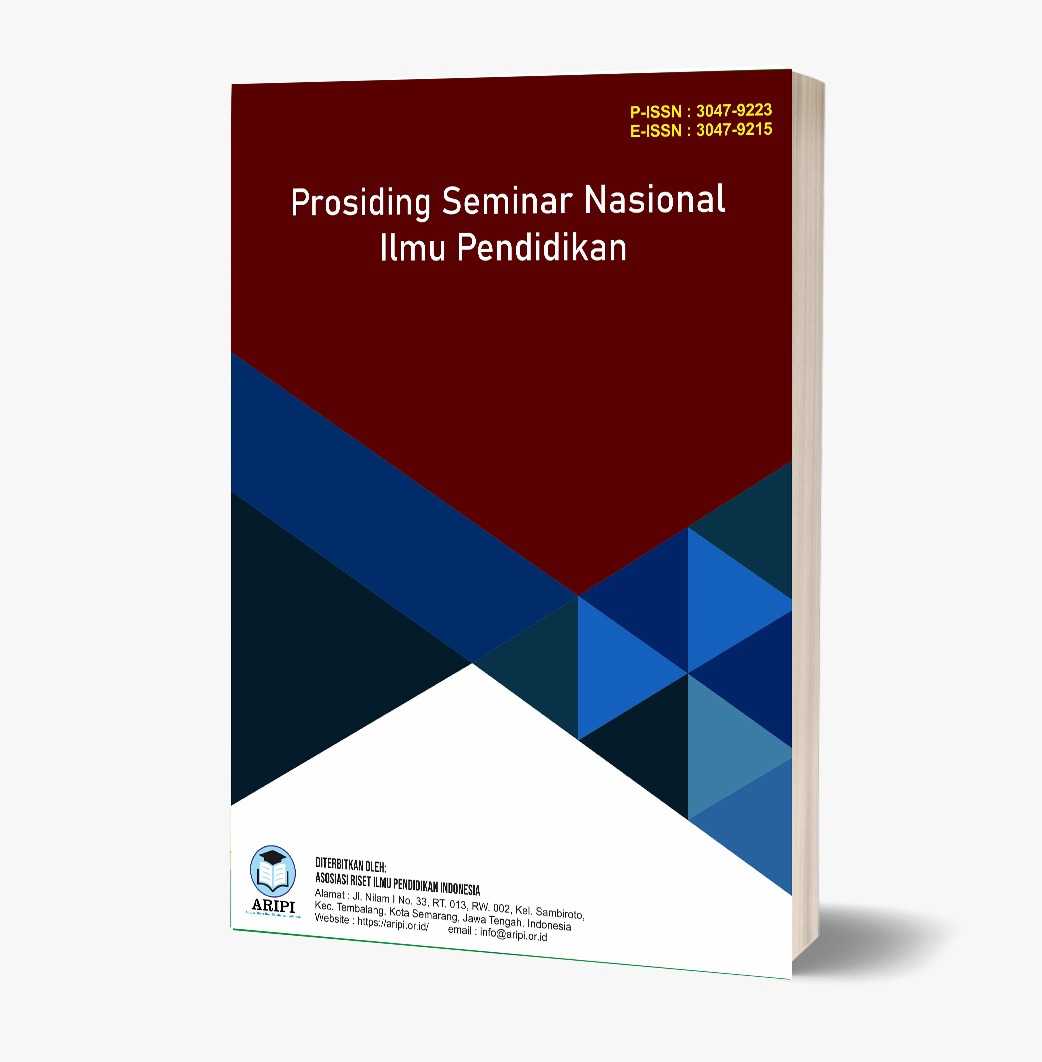Kesejahteraan Psikologis Pelajar Sekolah Berasrama: Analisis Hubungan Interpersonal dan Efikasi Diri
DOI:
https://doi.org/10.62951/prosemnasipi.v1i2.29Keywords:
well-being, psychological, education, ArabicAbstract
This study aims to analyze the psychological well-being of boarding school students with a focus on interpersonal relationships and self-efficacy. This research employs a quantitative approach with a correlational survey design, involving 111 boarding school students in Indonesia. Data collection instrument is questionnaire to measure students’ psychological well-being referencing to two dimensions of self acceptance and positive relation with other. The analysis results indicate that interpersonal relationships and self-efficacy significantly influence students' psychological well-being. The average score for interpersonal relationships was 3.47, for loneliness and social support was 2.63, and for self-confidence was 3.29. These findings highlight the importance of strengthening social relationships and beliefs in students’ ability to complete a task in order to enhance psychological well-being. Recommendations are provided to develop social support programs and self-efficacy training skills in boarding schools.
References
Bandura, A. (1977). Self-efficacy: Toward a unifying theory of behavioral change. Psychological Review, 84(2), 191–215. doi: 10.1037/0033-295X.84.2.191
Creswell, J. W. (2014). Research Design: Qualitative, Quantitative, and Mixed Methods Approaches (4th ed.). Thousand Oaks, CA: SAGE Publications.
Huebner, E. S. (1991). Initial development of the Student’s Life Satisfaction Scale. School Psychology International, 12(3), 231–240. doi: 10.1177/0143034391123010
Keyes, C. L. M. (2006). Mental health in adolescence: Is America’s youth flourishing? American Journal of Orthopsychiatry, 76(3), 395–402. doi: 10.1037/0002-9432.76.3.395
Konu, A. I., & Rimpelä, M. K. (2002). Well-being in School A Conceptual Model. Health Promotion International Journal Vol, 17(1), 79–86.
Kurniasih, N. (2017). Kesejahteraan Siswa di Sekolah Berasrama. In Diunduh pada Mei 2024. Retrieved from https://eprints.ums.ac.id/53965/1/naskah%20publikasi.pdf.
Oberle, E., Schonert-Reichl, K. A., & Thomson, K. C. (2010). Understanding the Link Between Social and Emotional Well-Being and Peer Relations in Early Adolescence: Gender-Specific Predictors of Peer Acceptance. Journal of Youth and Adolescence, 39(11), 1330–1342. doi: 10.1007/s10964-009-9486-9
Poyrazli, S., & Lopez, M. D. (2007). An exploratory study of perceived discrimination and homesickness: A comparison of international students and American students. The Journal of Psychology, 141(3), 263–280. doi: 10.3200/JRLP.141.3.263-280
Puskar, K. R., Sereika, S. M., Lamb, J., Tusaie-Mumford, K., & McGuinness, T. (2010). Screening, Brief Intervention, and Referral to Treatment (SBIRT) for Depression in Adolescents in School-Based Health Clinics. Issues in Mental Health Nursing, 31(3), 207–213. doi: 10.3109/01612840903420522
Putri, R. I. I., Araiku, J., & Sari, N. (2021). Statistik Deskriptif. Bening Media Publishing.
Ryff, C. D. (1989). Happiness is everything, or is it? Explorations on the meaning of psychological well-being. Journal of Personality and Social Psychology, 57(6), 1069–1081. doi: 10.1037/0022-3514.57.6.1069
Steinberg, L. (2014). Age of opportunity: Lessons from the new science of adolescence. New York, NY: Houghton Mifflin Harcourt.
Sullivan, H. S. (1953). The Interpersonal Theory of Psychiatry. New York, NY: Norton.
Thurber, C. A., & Walton, E. A. (2012). Homesickness and adjustment in university students. Journal of American College Health, 60(5), 415–419. doi: 10.1080/07448481.2012.673520
Trijayanti, U., Gunawan, G., Savitri, J., Gunawan, G. Y. C., Satyawan, L. I., Bawazier, B. A., & Wardani, R. (2022). Diseminasi Penelitian Spiritualitas Dan Kesejahteraan Psikologis. Zahir Publishing.
Yin, X. Q., Wang, L. H., Zhang, G. D., Liang, X. B., Li, J., Zimmerman, M. A., & Wang, J. L. (2017). The promotive effects of peer support and active coping on the relationship between bullying victimization and depression among Chinese boarding students. Psychiatry Res, 256, 59–65.
Downloads
Published
How to Cite
Issue
Section
License
Copyright (c) 2024 Prosiding Seminar Nasional Ilmu Pendidikan

This work is licensed under a Creative Commons Attribution-ShareAlike 4.0 International License.







